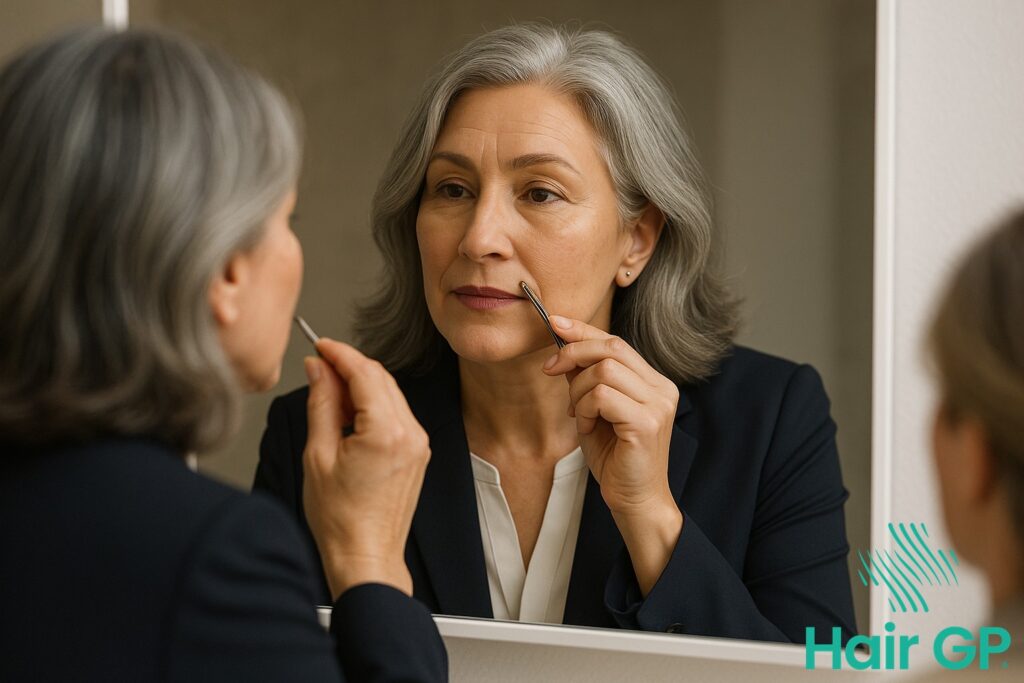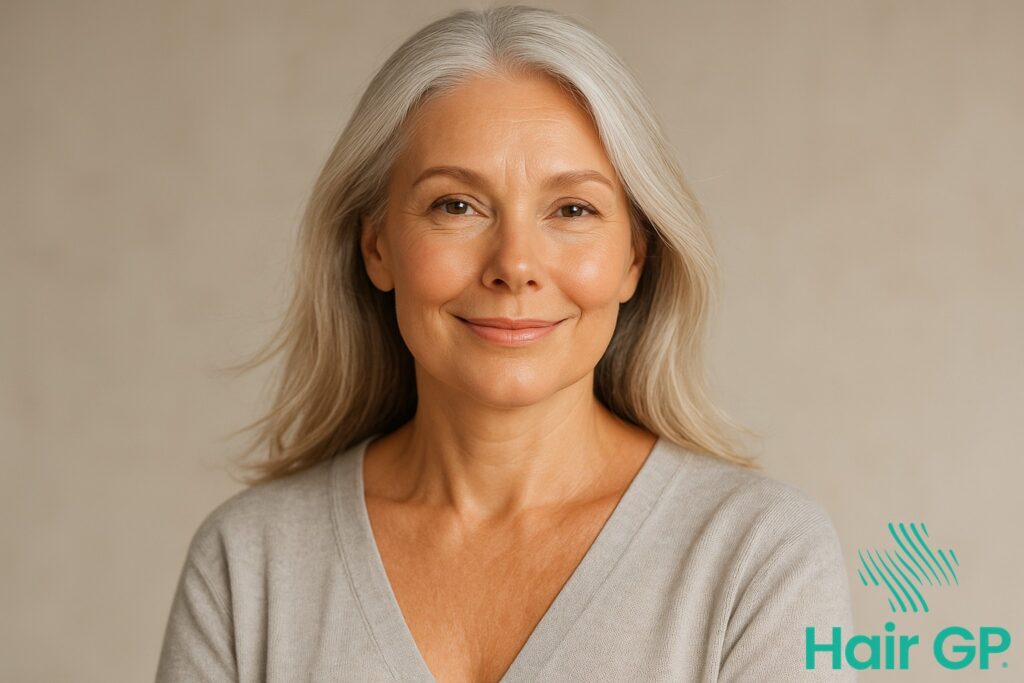Can HRT Help with Hair Loss? Exploring the Connection
Hair loss is a common issue that affects millions of individuals worldwide, transcending age and gender, though it holds particular significance for women undergoing menopause. The emotional toll of hair loss can be profound, impacting self-esteem and quality of life. In recent years, Hormone Replacement Therapy (HRT) has gained attention as a potential remedy for hair loss, particularly in those experiencing hormonal imbalances. This comprehensive guide explores the intricate relationship between HRT and hair loss, offering insights into whether HRT can help mitigate this challenging condition.

Understanding Hair Loss
Hair loss, medically known as alopecia, can be influenced by many factors. Hormonal changes, particularly during menopause, can significantly affect hair density and growth patterns. Genetics also play a pivotal role, with conditions like female pattern hair loss being hereditary. Furthermore, lifestyle factors such as stress, nutritional deficiencies, and certain medical conditions can exacerbate hair shedding. Understanding these causes is crucial for addressing the problem effectively.
Female Hair Loss and Hair Regrowth
The psychological effects of female hair loss extend beyond the physical manifestation. Many individuals experience significant anxiety, social withdrawal, and a decline in self-esteem, which can negatively impact both personal and professional life. The changes in appearance can affect how one perceives themselves and how they feel perceived by others, leading to challenges in social interactions and work-related confidence. Addressing the emotional aspects, including understanding the role of the hair follicle in hair health, is just as important as the physical, making a holistic approach, which considers both mental well-being and the condition of the hair follicle, essential for effective treatment.

What is Hormone Replacement Therapy (HRT)?
Hormone Replacement Therapy is a medical treatment primarily designed to relieve symptoms associated with menopause by replenishing lost hormones. During menopause, the body’s natural production of certain hormones, particularly oestrogen and progesterone, decreases significantly. These hormones are essential in various bodily functions, including regulating the menstrual cycle, maintaining bone density, and supporting hair growth. As a result, HRT aims to replace these hormones to help mitigate menopausal symptoms that can affect the quality of life.
HRT can be administered in several forms, such as oral tablets, skin patches, gels, and creams. This range of administration methods offers flexibility, allowing patients to choose the best form that suits their lifestyle and preferences. For example, skin patches may provide a more consistent hormone level over time, while gels and creams are sometimes preferred by very active women who don’t want to wear a patch 24/7.
The decision to begin HRT involves considering its potential to restore hormonal balance, thereby alleviating symptoms like hot flashes, night sweats, mood swings, and potentially hair loss. Additionally, HRT may offer protective benefits for bone health, reducing the risk of osteoporosis, which can become a concern post-menopause. However, each individual’s response to HRT can vary, necessitating a personalised treatment approach that considers their medical history, specific health conditions, and any potential risks associated with the therapy. Regular consultations with a healthcare provider are crucial to monitor progress and make any necessary adjustments to the treatment plan. That’s where the Hair GP is unique, as unlike other providers, we can prescribe both traditional hair loss medications and HRT.

How Can HRT Help with Hair Loss?
The relationship between hormones and hair growth is complex but well-documented. Oestrogen plays a significant role in prolonging the hair cycle’s anagen, or growth phase, which can promote fuller, healthier hair. During menopause, the decline in oestrogen levels can shorten this phase, resulting in increased hair shedding. HRT aims to counteract this by restoring hormonal equilibrium.
Scientific research supports the notion that HRT can be beneficial for women experiencing menopausal hair loss, although results can vary. HRT can significantly slow down hair loss and improve hair quality for some, while others may see limited benefits. Therefore, individuals must have realistic expectations and work closely with healthcare providers to monitor progress and adjust treatment as needed.
Benefits of Using HRT for Hair Loss
One of the primary benefits of Hormone Replacement Therapy (HRT) in hair loss is the potential improvement in hair density and volume. Many women report a noticeable reduction in hair shedding and an increase in hair thickness after starting HRT.
This improvement can often be attributed to stabilising hormone levels, which is critical in the hair growth cycle. Enhanced hair density can boost self-confidence and contribute to a greater sense of well-being, as individuals feel more satisfied with their appearance.
In addition to hair-related benefits, HRT can also alleviate other menopausal symptoms such as hot flashes, night sweats, mood swings, and vaginal dryness.
By addressing a range of menopausal challenges, HRT targets hair loss and contributes to an overall improvement in quality of life. This comprehensive approach offers a solution that can have far-reaching positive effects on both physical and emotional health, allowing individuals to lead a more balanced and fulfilling life during the menopausal transition.

Potential Risks and Side Effects of HRT
While HRT offers many benefits, it is not without risks. Common side effects include headaches, breast tenderness, and nausea. More serious risks, such as an increased likelihood of blood clots, stroke, and certain types of cancer, have also been associated with long-term HRT use. These potential risks underscore the importance of undergoing HRT under strict medical supervision.
Healthcare providers can help mitigate risks by tailoring HRT plans to individual needs, closely monitoring health, and making necessary adjustments. Regular check-ups and open communication with healthcare professionals are vital components of safe and effective HRT use.
Alternative Treatments for Hair Loss
Several alternative treatments are available for individuals who cannot or choose not to use hormone replacement therapy (HRT) to address hair loss. One popular option is Minoxidil, a topical solution available over the counter. Minoxidil stimulates hair growth and is widely used by both men and women. It typically needs to be applied directly to the scalp twice daily, and users may start seeing results within a few months of consistent use.
Another innovative approach is low-level laser therapy (LLLT), which offers a noninvasive option that has shown promise in promoting hair density and thickness. This treatment involves using devices that emit low-level lasers to stimulate the hair cycle. LLLT can be performed in clinics or with at-home devices designed for regular use.
Platelet-rich plasma (PRP) therapy is an advanced treatment involving injections that stimulate hair follicles using the patient’s own blood components. In this procedure, a small amount of blood is drawn from the patient, processed to concentrate the platelets, and then injected into the scalp. The growth factors in the platelets are believed to encourage hair growth and improve hair thickness.
Depending on individual needs and preferences, these alternatives can be used alone or in combination with hormone replacement therapy. It is important to note that results can vary, and some treatments may work better for certain individuals than others.
Consulting with a healthcare provider or dermatologist specialising in hair loss can help determine the most suitable options for each person’s unique situation. These experts can provide guidance on the potential benefits and any possible side effects, ensuring a comprehensive approach to managing hair loss effectively.
Who Should Consider HRT for Hair Loss?
HRT is most beneficial for women experiencing hair loss due to hormonal changes, particularly during or after menopause. However, not everyone is a suitable candidate for HRT. Factors such as medical history, family history of hormone-related cancers, and personal health conditions must be considered. A thorough evaluation by a healthcare provider is essential to determine candidacy for HRT.
It’s important to approach HRT as part of a comprehensive treatment plan, which includes lifestyle changes, dietary adjustments, and stress management techniques. Personalised care ensures that all aspects of health are considered, maximizing the potential benefits of HRT.
Conclusion: Summarising the Potential of HRT in Treating Hair Loss
HRT represents a promising approach to managing hair loss, particularly for those affected by hormonal fluctuations. While its effectiveness can vary, many individuals have experienced significant improvements in hair quality and overall well-being. Understanding the potential benefits and risks of HRT allows for informed decision-making and tailored treatment plans.

Next Steps: Seeking Professional Advice
Before embarking on HRT or any alternative hair loss treatment, it is crucial to consult with a healthcare provider or hair restoration specialist. These professionals can offer personalised advice, conduct necessary assessments, and help develop a treatment plan that aligns with individual health goals. Taking an informed, guided approach ensures that individuals can confidently address hair loss and enhance their overall health and quality of life.
By thoroughly exploring all available options and seeking expert guidance, such as at the Hair GP, individuals can make empowered decisions about their hair health and healthy hair growth, ultimately restoring confidence and vitality.
Why Choose the Hair GP for Your Hair Restoration Needs
What sets the Hair GP apart from other providers is the unique dual training of Dr. Amy as both a hair restoration specialist and a general practitioner. This exceptional combination allows her to offer a more holistic assessment of hair loss, integrating hormone replacement therapy (HRT) and medical therapies seamlessly into your treatment plan. While many other providers may refer you to consult with your GP for aspects of your care, we at the Hair GP are equipped to manage all your needs in one dedicated appointment. This not only saves you time but also ensures a comprehensive approach to your hair health, providing tailored solutions that consider your overall well-being.
Frequently Asked Questions (FAQ)
There are various effective hair loss treatments tailored to individual needs, including medical therapies, hormone replacement therapy (HRT), and specialised hair restoration techniques. A consultation with a specialist can help determine the most suitable options for your specific situation.
Individuals with a history of breast cancer may have unique considerations when it comes to hair loss treatments. It is essential to discuss any concerns regarding treatment options with your healthcare provider to ensure safety and appropriateness based on your medical history.
Menopausal hair thinning is a common issue experienced by many individuals due to hormonal imbalance in the body. These fluctuations can affect hair growth cycles and lead to a decrease in hair density.
Yes, hormone replacement therapy (HRT) can potentially help with hair loss, particularly for those experiencing hair thinning related to hormonal imbalances. HRT may assist in restoring hair health and promoting regrowth, making it a valuable consideration in a comprehensive hair treatment plan.
For menopausal hair thinning, a multifaceted approach often yields the best results. A combination of HRT, nutritional support, medical therapies, and lifestyle changes can help address this concern effectively. Consulting a specialist can provide personalised guidance based on your unique circumstances.









